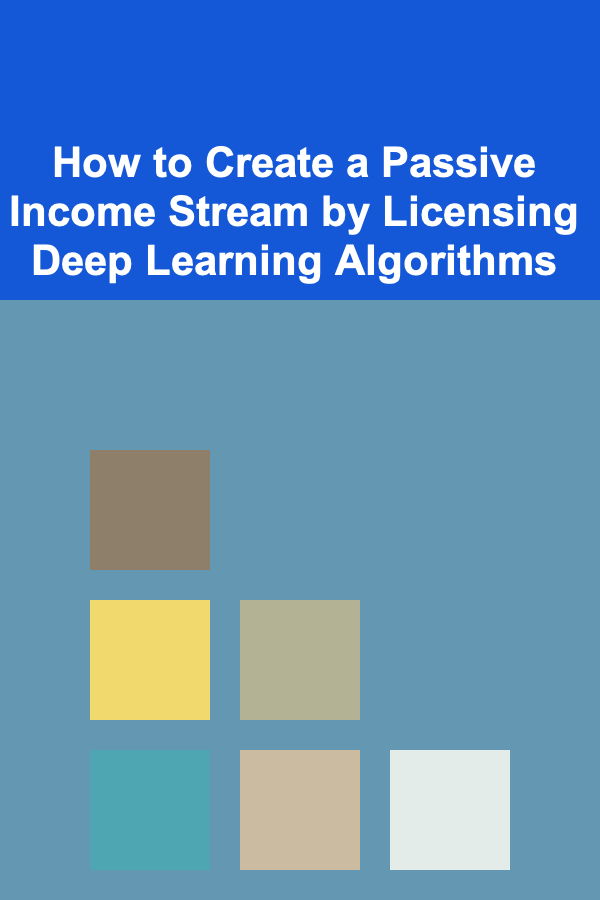
How To Use AI Tools for Career Advancement
ebook include PDF & Audio bundle (Micro Guide)
$12.99$5.99
Limited Time Offer! Order within the next:

In recent years, Artificial Intelligence (AI) has evolved from a futuristic concept to a present-day reality that is reshaping industries, workflows, and even personal career development. AI tools are no longer just for tech giants and data scientists; they are becoming accessible to professionals in various fields, making them powerful allies for career advancement.
In this article, we will explore how AI tools can be utilized effectively to boost your career, enhance productivity, and help you stay ahead in the competitive job market. Whether you're a seasoned professional or just starting your career journey, these tools can offer immense benefits that can accelerate your growth and open new opportunities.
The Role of AI in Career Advancement
1. Personalization and Efficiency
AI tools, from machine learning algorithms to automated assistants, have the ability to process vast amounts of data and provide personalized recommendations. In the context of career advancement, this means AI can analyze your work habits, skills, and progress to give tailored suggestions on improving your workflow, optimizing your job search, or enhancing your learning.
For instance, AI-powered job platforms like LinkedIn and Glassdoor use algorithms to recommend job postings that match your skill set, qualifications, and preferences. Similarly, AI-based project management tools such as Trello or Asana help you organize tasks, set priorities, and streamline collaboration with minimal effort.
2. Skills Development
AI is a game-changer when it comes to learning and skill development. With the rise of online learning platforms like Coursera, Udacity, and LinkedIn Learning, AI can recommend courses, track your learning progress, and even adapt content to match your learning style.
One notable example is the use of AI in adaptive learning platforms. These platforms analyze your performance and customize lessons to address knowledge gaps, ensuring more efficient learning. By mastering in-demand skills, such as data analysis, machine learning, or project management, you can increase your value in the job market and open doors for career advancement.
3. Networking and Job Search
Job hunting can be a daunting and time-consuming process. AI tools have transformed this process by providing smarter, more efficient ways to connect with potential employers and expand your professional network.
Platforms like LinkedIn and Indeed leverage AI to match candidates with job opportunities that align with their qualifications and interests. AI-powered chatbots and virtual assistants can also help you prepare for interviews, offering tailored questions and providing feedback to improve your performance.
Additionally, AI-driven tools like Grammarly and Hemingway help you craft professional resumes, cover letters, and emails by offering suggestions for better clarity, structure, and tone. This helps you stand out in a crowded job market by ensuring that your communication is polished and professional.
4. Productivity and Time Management
AI tools are particularly useful for enhancing productivity and time management---key factors in career success. These tools can automate repetitive tasks, suggest time-saving workflows, and optimize your schedule.
For example, AI-powered calendar assistants such as Google Calendar's Smart Scheduling feature can prioritize your meetings, sync your calendar with other devices, and send reminders for upcoming events. AI-driven email assistants like SaneBox automatically sort and prioritize your inbox, ensuring that important emails don't get lost in the clutter.
Furthermore, AI tools such as Otter.ai provide transcription services, allowing you to focus on important discussions during meetings while the tool takes care of recording and transcribing the conversation. This not only saves you time but also ensures you never miss crucial details.
Using AI Tools for Specific Career Paths
Different career paths can benefit from AI tools in unique ways. Below are examples of how various professions can leverage AI for career advancement.
1. Marketing and Advertising
In the marketing and advertising industry, AI tools help professionals stay ahead by automating processes, analyzing data, and personalizing campaigns. AI-powered tools like HubSpot and Marketo can automate email marketing campaigns, segment customer bases, and provide insights on customer behavior, enabling marketers to craft more targeted and effective campaigns.
Social media platforms like Facebook and Instagram also use AI algorithms to help marketers target specific demographics and optimize ad spend. AI tools can even predict trends and recommend content strategies, ensuring that marketers stay relevant in an ever-changing digital landscape.
2. Software Development
Software developers can use AI tools to accelerate their coding, improve efficiency, and reduce errors. AI-powered code editors, such as GitHub Copilot, help developers by suggesting code snippets, detecting errors, and even writing entire functions based on natural language descriptions.
Additionally, AI tools like TensorFlow and PyTorch enable developers to build advanced machine learning models. By mastering these AI tools, developers can position themselves as experts in AI and machine learning, which are among the most sought-after skills in tech.
3. Healthcare
AI tools have revolutionized the healthcare sector, with applications in diagnostics, patient care, and administrative tasks. For healthcare professionals, AI can help streamline workflows and enhance decision-making. For example, AI-powered diagnostic tools such as IBM Watson Health can analyze medical data and assist doctors in diagnosing diseases with greater accuracy.
Medical researchers can use AI to analyze large datasets, identify patterns, and generate insights for new treatments. AI-powered tools such as Bioinformatics and machine learning algorithms can help medical professionals stay up-to-date with the latest research and innovations.
4. Education
In the education sector, AI tools can help educators and learners alike. For teachers, AI can assist in creating personalized learning experiences for students. AI-powered platforms like DreamBox or Knewton provide real-time data on student progress and suggest individualized lesson plans based on each student's strengths and weaknesses.
For students, AI can serve as a tutor, offering personalized feedback and explanations to help improve learning outcomes. AI-driven platforms such as Khan Academy and Duolingo use gamification and adaptive learning to keep students engaged and motivated.
5. Finance and Accounting
AI is transforming the finance and accounting industries by automating routine tasks, improving data analysis, and providing more accurate predictions. For finance professionals, AI tools such as FinTech solutions and automated trading algorithms can help streamline tasks like risk assessment, investment analysis, and portfolio management.
AI-driven accounting software like QuickBooks and Xero automates tasks such as bookkeeping, invoicing, and tax filing, freeing up accountants to focus on more strategic activities. By adopting these AI tools, finance professionals can improve their productivity and decision-making processes.
Overcoming Challenges in Using AI for Career Advancement
While AI tools offer numerous benefits, they also present certain challenges that professionals should be aware of. Below are some common obstacles and ways to overcome them.
1. Resistance to Change
One of the biggest challenges to adopting AI tools is resistance to change. Many professionals may feel overwhelmed by the idea of integrating AI into their daily workflows or may be hesitant to rely on AI for tasks they once performed manually.
To overcome this challenge, it's important to start small and gradually introduce AI tools into your workflow. Focus on tools that offer the greatest impact for your specific needs and invest time in learning how to use them effectively. The more familiar you become with AI, the easier it will be to embrace its potential.
2. Privacy and Data Security
AI tools rely heavily on data to make decisions and provide insights. As a result, privacy and data security are major concerns, especially in industries such as healthcare and finance.
To mitigate these risks, professionals should ensure they are using AI tools that comply with data protection regulations, such as the General Data Protection Regulation (GDPR). Additionally, they should be cautious about sharing sensitive information and ensure that any AI tools they use have robust security measures in place to protect their data.
3. Over-Reliance on AI
While AI can be an invaluable asset, it's important not to become overly reliant on it. AI tools are designed to complement human decision-making, not replace it. Over-relying on AI could result in a loss of critical thinking skills and a lack of personal judgment.
To avoid this, professionals should use AI tools as a supplement to their own expertise, leveraging the strengths of both human insight and AI-powered data. By balancing the two, professionals can make more informed decisions and stay ahead in their careers.
Conclusion
AI tools are no longer a luxury reserved for specific industries or professions---they are becoming an essential part of career advancement across all fields. Whether you're looking to enhance your skills, improve productivity, or expand your network, AI tools can provide the support you need to succeed.
By embracing AI in your career, you can stay competitive, continuously improve, and open new opportunities for growth. However, it's essential to approach AI with a mindset of continuous learning, balance, and caution. With the right tools and strategies, AI can help you achieve your career goals and propel you forward into a successful future.
Embrace the potential of AI, and let it be your ally in navigating the evolving job market and shaping your career trajectory.

How to Create a Passive Income Stream by Licensing Deep Learning Algorithms
Read More
How to Handle Tenant Complaints Professionally and Efficiently
Read More
How to Manage Your Finances as a Freelancer or Self-Employed
Read More
How to Plan Your Home Design and Budget Effectively
Read More
How to Prepare for Your Honeymoon After the Wedding: An Actionable Guide
Read More
How to Set Up a Home Party That's Kid-Friendly and Fun
Read MoreOther Products

How to Create a Passive Income Stream by Licensing Deep Learning Algorithms
Read More
How to Handle Tenant Complaints Professionally and Efficiently
Read More
How to Manage Your Finances as a Freelancer or Self-Employed
Read More
How to Plan Your Home Design and Budget Effectively
Read More
How to Prepare for Your Honeymoon After the Wedding: An Actionable Guide
Read More